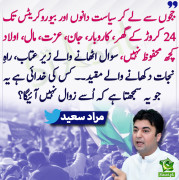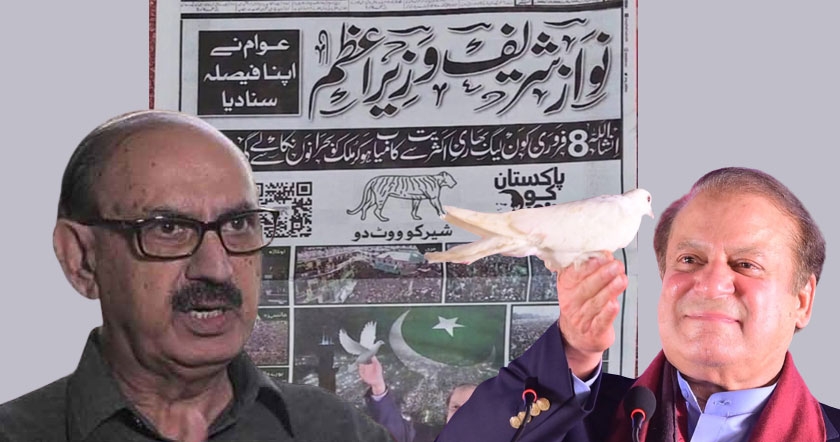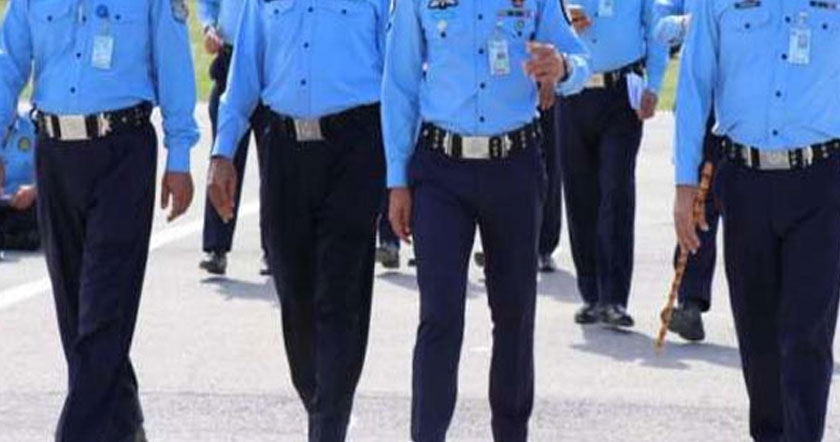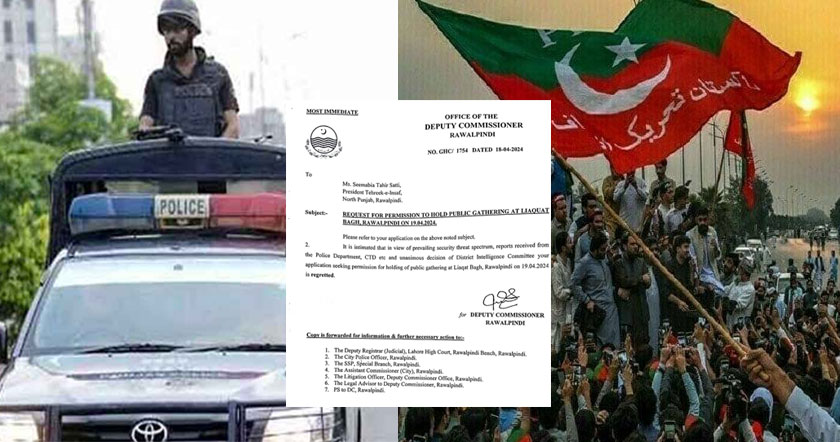You are using an out of date browser. It may not display this or other websites correctly.
You should upgrade or use an alternative browser.
You should upgrade or use an alternative browser.
Last Glimpse of Great "Moin Akhter"
- Thread starter Tilloo
- Start date
-
- Tags
- glimpse great moin akhter
ahmadalikhan
MPA (400+ posts)
but mein ne suna tha news mein k Moin Akhtar ki wasiyat hai k uss ke merne pe photos etc na bnayi jaen uss ki....aur koi roye bhi na. lekin shaid ye wasiyat puri karna kafi mushkil tha.
dukelondon
Senator (1k+ posts)
@ahmadalikhan
Brother, wasiyat us cheez ki karni chahiye jo insaan kay bas mein ho warna wasiyat ka bharam nahi rehta. Dunya bhar mein har aankh ashkbaar thee. Mujhay to aisa laga kay mera koi apna saga bara bhai intiqaal farma gaya ho. Meray dosto aur rishtay daron fka bhi kuch yahi haal hai. Lakhon loag janazay mein shareek hona chahtay thay laiken dangerous security situation ki waja say shareek nahi ho sakey :-(
Brother, wasiyat us cheez ki karni chahiye jo insaan kay bas mein ho warna wasiyat ka bharam nahi rehta. Dunya bhar mein har aankh ashkbaar thee. Mujhay to aisa laga kay mera koi apna saga bara bhai intiqaal farma gaya ho. Meray dosto aur rishtay daron fka bhi kuch yahi haal hai. Lakhon loag janazay mein shareek hona chahtay thay laiken dangerous security situation ki waja say shareek nahi ho sakey :-(
QaiserMirza
Chief Minister (5k+ posts)
کسی کے مرنے پر بلند آواز رونا، سینہ کوبی کرنا اور اپنے آپ کو پیٹنا سے منع فرمایا ہے
بدنصیبی کہ یہ سب اس جنازے میں موجود تھا
حتہ کہ عورتیں نامحرم مردوں سے چمنٹ کر رو رہی تھیں
انا للہ و انا الیہ راجعون
ہمارا دین ایک مکمل نظام حیات دیتا ہے اور اس پر عمل کرنے ہی میں ہماری نجات اور بہتری ہے
مگر افسوس کہ ہم نے اپنے دین کو صرف مسجد اور ملّا تک ہی محدود کردیا ہے
اور خود مادر پدر آزاد ہو گئے ہیں اور اپنے لیے قانون خود ہی مقرر کرلیا ہے
بدنصیبی کہ یہ سب اس جنازے میں موجود تھا
حتہ کہ عورتیں نامحرم مردوں سے چمنٹ کر رو رہی تھیں
انا للہ و انا الیہ راجعون
ہمارا دین ایک مکمل نظام حیات دیتا ہے اور اس پر عمل کرنے ہی میں ہماری نجات اور بہتری ہے
مگر افسوس کہ ہم نے اپنے دین کو صرف مسجد اور ملّا تک ہی محدود کردیا ہے
اور خود مادر پدر آزاد ہو گئے ہیں اور اپنے لیے قانون خود ہی مقرر کرلیا ہے
dukelondon
Senator (1k+ posts)
rona aur dukh hona insaani ehsaasaat hain. Ye khud ba khud ubhartay hain. Kuch logo ko bohat rona aata hai aur kuch logo ko bilkul rona nahi aata laiken wo dil mein ro rahey hotay hain. Laiken ye insaani ehsasaat hain. Shayateen aur Iblees ki fauj kay sipahi (Zalimeen) in ehsasaat say aari hain :-)
Pakistani1947
Chief Minister (5k+ posts)
Prophet Muhammad (pbuh) has forbidden crying out loud and wailing over the dead person
Narrated Abu Burda: That his father said, "When Umar was stabbed, Suhaib started crying: O my brother! 'Umar said, 'Don't you know that the Prophet said: The deceased is tortured for the weeping of the living'?" (Sahih Bukhari, Book #23, Hadith #377)
Narrated Jabir bin 'Abdullah : On the day of the Battle of Uhud, my father was brought and he had been mayhemed and was placed in front of Allah's Apostle and a sheet was over him. I went intending to uncover my father but my people forbade me; again I wanted to uncover him but my people forbade me. Allah's Apostle gave his order and he was shifted away. At that time he heard the voice of a crying woman and asked, "Who is this?" They said, "It is the daughter or the sister of Amr." He said, "Why does she weep? (or let her stop weeping), for the angels had been shading him with their wings till he (i.e. the body of the martyr) was shifted away." (Sahih Bukhari,Book #23, Hadith #381)
Narrated 'Aisha: When the Prophet got the news of the death of Ibn Haritha, Ja'far and Ibn Rawaha he sat down andwomen of Ja'far. The Prophet ordered him to forbid them. The man went and came back saying that he had told them but they did not listen to him. The Prophet (p.b.u.h) said, "Forbid them." So again he went and came back for the third time and said, "O Allah's Apostle! By Allah, they did not listen to us at all." ('Aisha added): Allah's Apostle ordered him to go and put dust in their mouths. I said, (to that man) "May Allah stick your nose in the dust (i.e. humiliate you)! You could neither (persuade the women to) fulfill the order of Allah's Apostle nor did you relieve Allah's Apostle from fatigue. " looked sad and I was looking at him through the chink of the door. A man came and told him about the crying of the (Sahih Bukhari, Book #23, Hadith #386)
Anas b. Malik reported that Allah's Messenger (may peace be upon him) came to a woman who had been weeping for her (dead) child, and said to her: Fear Allah and show endurance. She (not recognising him) said: You have not been afflicted as I have been. When he (the Holy Prophet) had departed, it was said to her that he was the Messenger of Allah (may peace be upon him), she was mortally shocked. She came to his door and she did not find doorkeepers at his door. She said: Messenger of Allah. I did not recognise you. He said: Endurance is to be shown at first blow, or at the first blow. (Sahih Muslim, Book #004, Hadith #2013)
'Abdullah b. 'Umar reported that Hafsa wept for 'Umar (when he was about to due). He ('Umar) said: Be quiet, my daughter. Don't you know that the Messenger of Allah (may peace be upon him) had said:" The dead is punished because of his family's weeping over it"?(Sahih Muslim, Book #004, Hadith #2015)
Ibn 'Umar reported: When 'Umar was wounded he fainted, and there was a loud lamentation over him. When he regained consciousness he said: Didn't you know that the Messenger of Allah (may peace be upon him) said:" The dead is punished because of the weeping of the living"? (Sahih Muslim, Book #004, Hadith #2018)
Narrated Abu Burda: That his father said, "When Umar was stabbed, Suhaib started crying: O my brother! 'Umar said, 'Don't you know that the Prophet said: The deceased is tortured for the weeping of the living'?" (Sahih Bukhari, Book #23, Hadith #377)
Narrated Jabir bin 'Abdullah : On the day of the Battle of Uhud, my father was brought and he had been mayhemed and was placed in front of Allah's Apostle and a sheet was over him. I went intending to uncover my father but my people forbade me; again I wanted to uncover him but my people forbade me. Allah's Apostle gave his order and he was shifted away. At that time he heard the voice of a crying woman and asked, "Who is this?" They said, "It is the daughter or the sister of Amr." He said, "Why does she weep? (or let her stop weeping), for the angels had been shading him with their wings till he (i.e. the body of the martyr) was shifted away." (Sahih Bukhari,Book #23, Hadith #381)
Narrated 'Aisha: When the Prophet got the news of the death of Ibn Haritha, Ja'far and Ibn Rawaha he sat down andwomen of Ja'far. The Prophet ordered him to forbid them. The man went and came back saying that he had told them but they did not listen to him. The Prophet (p.b.u.h) said, "Forbid them." So again he went and came back for the third time and said, "O Allah's Apostle! By Allah, they did not listen to us at all." ('Aisha added): Allah's Apostle ordered him to go and put dust in their mouths. I said, (to that man) "May Allah stick your nose in the dust (i.e. humiliate you)! You could neither (persuade the women to) fulfill the order of Allah's Apostle nor did you relieve Allah's Apostle from fatigue. " looked sad and I was looking at him through the chink of the door. A man came and told him about the crying of the (Sahih Bukhari, Book #23, Hadith #386)
Anas b. Malik reported that Allah's Messenger (may peace be upon him) came to a woman who had been weeping for her (dead) child, and said to her: Fear Allah and show endurance. She (not recognising him) said: You have not been afflicted as I have been. When he (the Holy Prophet) had departed, it was said to her that he was the Messenger of Allah (may peace be upon him), she was mortally shocked. She came to his door and she did not find doorkeepers at his door. She said: Messenger of Allah. I did not recognise you. He said: Endurance is to be shown at first blow, or at the first blow. (Sahih Muslim, Book #004, Hadith #2013)
'Abdullah b. 'Umar reported that Hafsa wept for 'Umar (when he was about to due). He ('Umar) said: Be quiet, my daughter. Don't you know that the Messenger of Allah (may peace be upon him) had said:" The dead is punished because of his family's weeping over it"?(Sahih Muslim, Book #004, Hadith #2015)
Ibn 'Umar reported: When 'Umar was wounded he fainted, and there was a loud lamentation over him. When he regained consciousness he said: Didn't you know that the Messenger of Allah (may peace be upon him) said:" The dead is punished because of the weeping of the living"? (Sahih Muslim, Book #004, Hadith #2018)
Last edited:
QaiserMirza
Chief Minister (5k+ posts)
rona aur dukh hona insaani ehsaasaat hain. Ye khud ba khud ubhartay hain. Kuch logo ko bohat rona aata hai aur kuch logo ko bilkul rona nahi aata laiken wo dil mein ro rahey hotay hain. Laiken ye insaani ehsasaat hain. Shayateen aur Iblees ki fauj kay sipahi (Zalimeen) in ehsasaat say aari hain :-)
غم اور خوشی کا اظھار فطرت میں ہے
لیکن ان جذبات پر قابو رکھنا اور نبی کے احکامات پر عمل کرنا ہر مسلمان پر لازمی ہے
جو اپنے نفس پر قابو نہ رکھے تو اس میں اور جانور میں کوئی فرق نہیں
صحیح احادیث کی روشنی میں غم کے موقعے پر بلند آواز رونا، چہرہ اور سینہ کوبی کرنا اور اپنے آپ کو اذیت دینا حرام ہے
الله تعالی ہمیں قرآن اور سنت پر عمل کرنے کی توفیق عطا فرمائے
لیکن ان جذبات پر قابو رکھنا اور نبی کے احکامات پر عمل کرنا ہر مسلمان پر لازمی ہے
جو اپنے نفس پر قابو نہ رکھے تو اس میں اور جانور میں کوئی فرق نہیں
صحیح احادیث کی روشنی میں غم کے موقعے پر بلند آواز رونا، چہرہ اور سینہ کوبی کرنا اور اپنے آپ کو اذیت دینا حرام ہے
الله تعالی ہمیں قرآن اور سنت پر عمل کرنے کی توفیق عطا فرمائے
Pakistani1947
Chief Minister (5k+ posts)
Mus‘ab ibn ‘Umair was a sahabi (companion) of Muhammad
He was from the Banū ‘Abd al-Dār branch of the tribe of Quraish. He embraced Islam in 614 and, on the advice of the Prophet,
went to Abyssinia for safety with other Shabas. He martyred in the Battle of Uhud in 625. He is said to be the first envoy of Islam.
When the battle came to an end the Prophet stood by the dead body of Mus‘ab ibn ‘Umair and recited the verse: (Minal momeneena rejalun sadqu ma ‘ahadullaha ‘ alaihe) Meaning: “There are some persons among the devoted Muslims (momeneen) who kept the promise made to Allah.”
When he died, the non-believers falsely claimed the prophet was dead, because the face of Mus'ab bin umair was similar to that of the prophet.
While returning from Uhud after burying the martyrs, the Prophet Muhammad(صلی الله علیھ وآلہ وسلم) met Hammanah bint Jahsh, the wife of Mus'ab. He told her about the killing of her brother, Abdullah ibn Jahsh. She patiently listened and prayed for the martyr. Then the Prophet informed her of the Killing of her maternal uncle Hamza Bin Abdul Muttalib. She remained calm and prayed for her uncle. Then the Prophet broke the news of the martyrdom of her husband upon which she could not control herself and broke into tears and started crying loudly.
The women mentioned in the above narration was not the only one who broke into tears and started crying loudly after seeing a dead one. The point is that our beloved Prophet Muhammad forbid this practice:
Narrated 'Aisha: When the Prophet got the news of the death of Ibn Haritha, Ja'far and Ibn Rawaha he sat down and looked sad and I was looking at him through the chink of the door. A man came and told him about the crying of the women of Ja'far. The Prophet ordered him to forbid them. The man went and came back saying that he had told them but they did not listen to him. The Prophet (p.b.u.h) said, "Forbid them." So again he went and came back for the third time and said, "O Allah's Apostle! By Allah, they did not listen to us at all." ('Aisha added): Allah's Apostle ordered him to go and put dust in their mouths. I said, (to that man) "May Allah stick your nose in the dust (i.e. humiliate you)! You could neither (persuade the women to) fulfill the order of Allah's Apostle nor did you relieve Allah's Apostle from fatigue. " (Sahih Bukhari, Book #23, Hadith #386)
Pakistani1947
Chief Minister (5k+ posts)
Islam is "Deen of Nature". Crying over the death of one's beloved is quite natural,no one can control the emotions at that time.How it is possible?This all story narrated above seems un-natural.
It is product of "Rivayat" which damaged Islam badly.
The death of the Prophet's son, Ibrahim, born of Miriyah (May Allah be pleased with her) had occurred in the tenth year of Hijra. The Ahadith clearly prove that weeping over a loved one's death is permissible. But it should be void of wailing.
Wailing ( واویلا۔ ماتم۔ نوحہ) is unanimously forbidden (Haram) as will be mentioned later on. There are some Ahadith which forbid us from crying over somebody's death, and which inform us that the dead will be tormented in their graves as a result of their relatives crying over their death. This prohibition applies only to those cases where crying is accompanied with lamenting and wailing. Weeping without these two is, permissible; and the Ahadith in support of this are many, including the following:
925. Ibn `Umar (May Allah be pleased with them) reported: The Messenger of Allah (PBUH) visited Sa`d bin `Ubadah during his illness. He was accompanied by `Abdur-Rahman bin `Auf, Sa`d bin Abu Waqqas and `Abdullah bin Mas`ud (May Allah be pleased with them). The Messenger of Allah (PBUH) began to weep. When his Companions saw this, their tears also started flowing. He (PBUH) said, "Do you not hear, Allah does not punish for the shedding of tears or the grief of the heart, but punishes or bestows mercy for the utterances of this (and he pointed to his tongue).''
[Al-Bukhari and Muslim].
Commentary : Under the stress of grief, man becomes heavy-hearted and tears flow out from his eyes. This is something natural and beyond human control. Rather the outflow of tears results from Divine compassion. This is neither forbidden nor subject to accountability. It is only wailing which is Haram, and is punishable. Yet, man is blessed with Divine mercy if he gives expression to patience and gratefulness by his tongue. Moreover, to mention the merits and excellence of a departed soul is in itself a good thing because others may be stimulated to adopt them. But to recount them by way of wailing is disliked. A Hadith says that a dead person is tormented because of the weeping of his household. Here weeping means lamenting and wailing. Otherwise, to weep is human instinct and no curbs can be put over it. Besides, this warning is meant for such a person who might have been accustomed to wailing during his lifetime. Or he might have left a will to his family for wailing over his death. May be he consciously avoided giving a predeath warning to his kith and kin against wailing. In all the three situations, he will be equally held accountable with his soul being tormented for the wailing of his relatives. In case, he is uninvolved in any of the situations, he will remain free from hellish torments. Instead the wailers will have to bear the brunt of their sin. As the Qur'an says, "No one laden with burdens can bear another's burden.'' (17:15).
926. Usamah bin Zaid (May Allah be pleased with him) reported: A grandson (child of the daughter) of the Messenger of Allah (PBUH) was presented to him while the child was at his last breath. Tears began to flow from the eyes of the Messenger of Allah (PBUH). Sa`d said to him: "What is this, O Messenger of Allah?'' He (PBUH) said, "It is mercy which Allah has placed in the hearts of his salves. Allah bestows His Mercy on the merciful among His slaves.''
[Al-Bukhari and Muslim].
927. Anas (May Allah be pleased with him) reported: The Messenger of Allah (PBUH) came to his son Ibrahim (May Allah be pleased with him) when he was breathing his last. The eyes of the Messenger of Allah (PBUH) began shedding tears. `Abdur-Rahman bin `Auf (May Allah be pleased with him) said, "O Messenger of Allah, you too weep?'' He (PBUH) said, "O Ibn `Auf! It is mercy.'' Then he began to weep and said, "The eyes are shedding tears and the heart is grieved, and we will not say except what pleases our Rubb. O Ibrahim! Indeed we are grieved by your departure.''
[Al-Bukhari].
Commentary : The death of the Prophet's son, Ibrahim, born of Miriyah (May Allah be pleased with her) had occurred in the tenth year of Hijra. The Ahadith clearly prove that weeping over a loved one's death is permissible. But it should be void of wailing.
Source
Pakistani1947
Chief Minister (5k+ posts)
Discussing such matters is waste of time,nothing else !
Knowledge of correct Islamic believes through authentic Hadeeths may be waste of time for you. But it is important for many of us.
-
-
-
-
کس بے وقوف نے 2300 پاؤنڈ لکڑی پہ ضائع کردۓ۔
28 | FORUM
-
-
-
ضمنی انتخابات:10 اضلاع میں دفعہ 144 نافذ
0 | خبریں






































